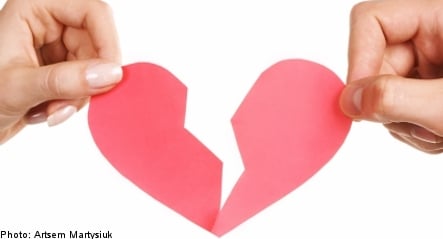There’s nothing quite like the rush of sharing that first few hours together: awkwardly asking questions, selecting words ever-so-carefully to impress one other, avoiding foods with high risk of becoming lodged between teeth (broccoli is a definite no).
And all the while secretly thinking about what’s beneath each others’ clothing.
First dates are always a challenge, however, even under ideal conditions.
But as I’ve learned during my brief time in Stockholm, dating in a foreign country requires one to bring their game to a whole different level – especially when that country is Sweden.
My first Swedish date took place about a month after I’d moved to the nation’s capital. And about two minutes into it, I realized whatever dating ‘expertise’ I thought I had gained during my single years, was useless.
The evening felt like a cavalcade of one hopeless moment after another. The dinner went like this: I asked a question. He answered. I asked another. He answered again. Not once did a question come my way. Was I that boring, or was he just that rude?
When the bill came, I offered to help pay as I always do; a well-rehearsed token gesture of kindness, which I expected to be duly rebuffed.
Instead, my Swedish companion “allowed” me to pay for half the meal. And then left me to cover our after-dinner coffee—another sure sign in my book that things were heading in the wrong direction.
Three hours later, my stomach full of non-free food and my mind reeling from the piss-poor conversation, my first Swedish date was finally over.
I returned home dejected; tucked myself into bed and curled up in the foetal position to watch reruns of classic movies.
How had things gone so horribly wrong?
Sharing this tragic tale with Swedish girlfriends over cocktails did little to life my spirits.
They all stared at me blankly, failing to understand my concerns.
“He let me pay!” I protested repeatedly.
No reaction.
“He hardly asked me any questions!”
More blank stares. Obviously, Swedish girl talk wasn’t going to help.
Frustrated, I decided to call an expert: Swedish author and dating guru Marie Hagberg.
I needed to know: was my foreign blood the cause of my first date failure, or do all Swedish women boldly face the torment of horrible first dates every time they embark on such missions?
“Swedish guys just don’t get it,” she says.
Whew! Ok, it’s not just me.
“You expect a guy to make the first move, but in Sweden he won’t unless he’s really drunk,” Hagberg said.
Her observation was certainly confirmed by my experience, as my would-be Swedish beau had undoubtedly downed a healthy dose of liquid courage before we struck up our conversation.
“Men here are very timid,” Hagberg continues.
“I am constantly trying to educate our male population about things like this, but I haven’t succeeded. Swedish guys don’t do anything and don’t make progress. At the same time they don’t want a girl to do anything either, so nothing happens. It’s very frustrating.”
Hagberg’s insights are anything but reassuring for my prospects for finding love in Sweden. Apparently I shouldn’t make the move, yet he won’t either.
But why? Are they shy?
According to Hagberg, there is truth to the old stereotype about Swedes not being the most outgoing types.
“Swedes are known for being kind of dull and boring,” she says.
No kidding.
“We are more closed than Americans or Brits,” she continues.
No argument there.
“Though we are still nice!” she adds.
Somehow, that promise of “niceness” feels empty at this particular juncture. After all, my first date companion simply talked about himself for three hours!
According to Hagberg, this self-centred pathology is common for Swedish men. In fact, their behavioural incompetence so deep and widespread that she has resorted to offering lessons about how to behave on a date.
“The most common thing I tell guys is to ask questions,” she explains.
That’s a good place to start.
“They get so excited if she is asking questions, they then forget to be polite and ask questions back.”
I don’t want to be critical of Hagberg’s teaching methods, but it seems to me her message isn’t getting through.
Then there’s that whole not-picking-up-the-check-thing.
“People in Sweden are so confused about this,” says Hagberg.
You don’t say.
“Most girls want a guy to pay, and most guys also think they should pay. But a lot are still confused, wondering whether to pay or split. I think the guys should pay the first time; it doesn’t mean he should pay every time, but just the first time. It has to do with manners and style.”
But why don’t they pay?
“Men think women earn almost as much as they do, so why should they pay? I think that’s bullshit,” she said.
Amen to that sister.
With Hagberg’s help, I slowly start to realize that a Swedish man on a first date is like a lost puppy trying to find his way. He knows not how to approach a lady, carry a conversation, or to offer to pay.
Poor things. I almost feel sorry for them. And I couldn’t help but wonder what could be responsible for stunting the dating intelligence of Swedish men so severely.
Hagberg’s answer catches me off guard.
“It has to do with our social welfare system,” she exclaims.
Come again?
“Here nobody is supposed to take care of their own life or future and people consider the government responsible for everything. That has coloured the world of dating, and gone overboard.”
So my dating failure can ultimately be attributed to an unforeseen side-effect of some grand experiment in social engineering?
Not exactly the culprit I was expecting, but then again, growing up in a capitalist system across the Atlantic, I had always been told that socialism is the root of all evil.
And now…it’s also the reason I’m still single in Sweden.



 Please whitelist us to continue reading.
Please whitelist us to continue reading.
Member comments